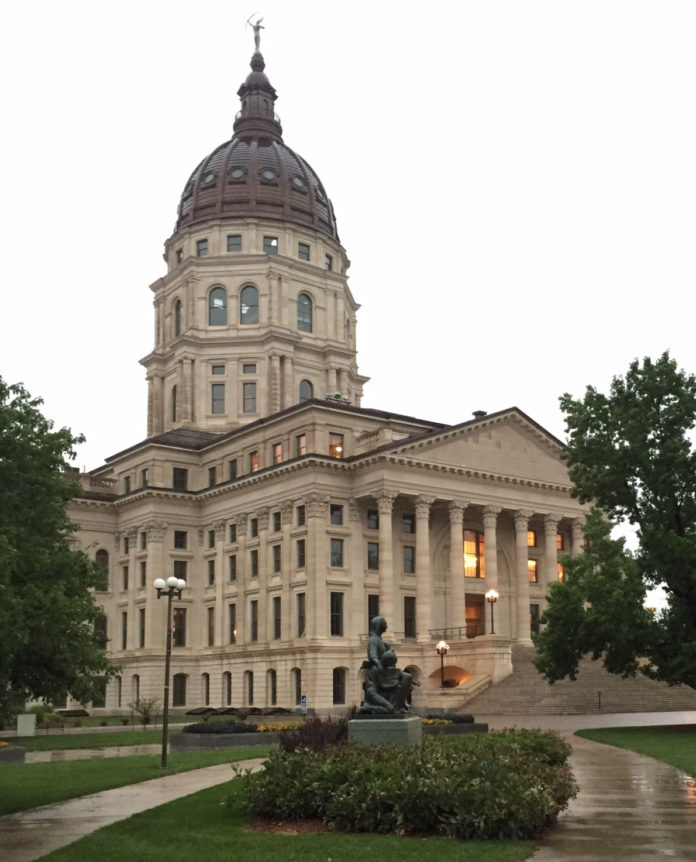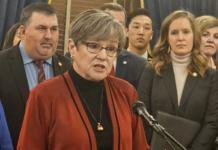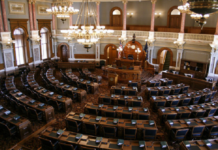A bill was introduced Tuesday morning that is expected to set the stage for potentially resolving litigation over whether the state should cover business losses suffered because of the shutdown during the pandemic.
The bill will provide a framework for compensating businesses for financial damage that they suffered because they either closed or their operations were limited because of restrictions imposed to limit the spread of COVID-19.
The bill was drawn up by lawyers for a Sedgwick County gym that is suing the state in an effort to get compensation after it was forced to close and operate under restrictions imposed during the pandemic.
“It may not be the perfect solution, but it’s the start of a conversation,” said Ryan Kriegshauser, one of the lawyers representing the gym. “It’s a good start at least.”
Kriegshauser said the bill introduced in the Senate tax committee would be the vehicle for dealing with the compensation issue.
Separate legislation in the House allowing commercial property owners to seek a property tax refund if their business was shut down is not expected to be in play.
House Majority Leader Gene Suellentrop said the bill was a priority for the Legislature given how many businesses have been affected by the pandemic.
Suellentrop said he wasn’t necessarily endorsing the language in the new bill, but said it was a starting point and a “working process.”
“There’s a lot of people who have been very, very damaged,” he said. “We’ trying to have as fair an opportunity for them to present their case and be compensated.”
The new bill calls for immediately setting aside the first $100 million of any money the state might receive in coronavirus relief funds to make businesses whole for any losses incurred because they were closed or because their operations were restricted.
The attorney general would be responsible for administering those funds with any payments from that money approved by the State Finance Council.
Beyond the $100 million set aside, the legislation also sets up a formula for compensating businesses seeking relief because of stay-at-home orders or other measures that were imposed to control the spread of COVID-19 during the pandemic.
The bill would make credits available to business owners who could apply them to either their income or property taxes.
Any business that resolves its claim with a cash settlement from the coronavirus relief money would not be eligible to seek other compensation provided for in the bill.
The bill calls for setting up a compensation formula this way:
- A business could receive tax credits equal to 1/12 of their owed income taxes in 2019 for every 30 days they were closed resulting from an order of the governor.
- A business could receive tax credits equal to 1/48 of their owed income taxes in 2019 for every 30 days their operations were restricted because of an order handed down by the governor.
- A business that was not running in 2019 could receive a tax credit equal to one-sixth of the income taxes they owed in 2020 for every 30 days they were closed because of an order issued by the governor.
- The same business could get a tax credit equal to 1/12 of the income taxes they owed for every 30 days their operations were restricted.
The bill would allow businesses to apply the tax credits accumulated under that formula to their property taxes if they choose.
The bill comes a couple months after the owner of Sedgwick County gym went to court, arguing that he’s entitled to compensation under state law because the government assumed use of the property as it undertook efforts to contain the spread of the virus.
The lawsuit contends the gym owner is entitled to compensation under the state’s emergency management law, which provides compensation for the taking or use of property if it is “commandeered or otherwise used in coping with a disaster.”
Omega Bootcamps and its owner, Ryan Floyd, reached an agreement with the state to delay the case so legislative changes could be considered that would allow for a consistent statewide process for considering these types of compensation claims.
Lawyers for the gym believe the delay was significant because it meant the lawsuit potentially could open the door to other claims from businesses who were hurt by COVID-19 restrictions.
Attorney General Derek Schmidt has said that he generally agreed that a case could be made for someone seeking compensation whose property was “significantly damaged” by government actions undertaken for the public welfare during a state of emergency.
“However, current law was not designed to address these sorts of business shutdown orders, and it is not certain – nor does the state concede – that the law as written applies on the facts of this or similar cases,” Schmidt said in a statement.
The agreement, he said, was an attempt to give the Legislature a chance to consider the public policy implications of compensation during an economic shutdown.
The cost of the new bill is not known yet, but lawyers for the gym say there is a risk of not settling the case and letting more businesses file for compensation under the emergency management law.
“People will get wide-eyed about the fiscal note, the question is what if we don’t do something.”















